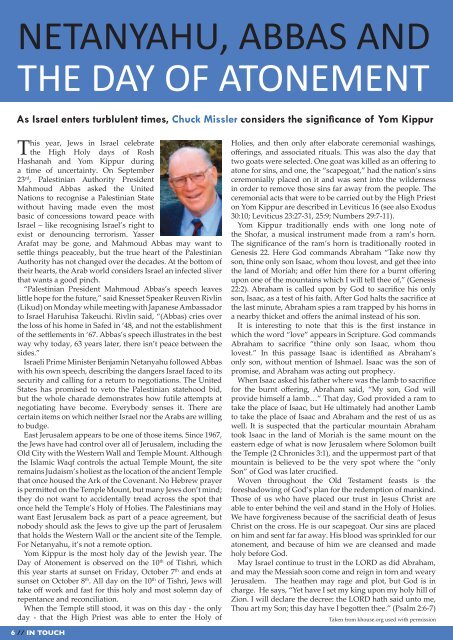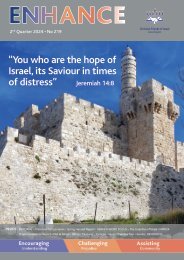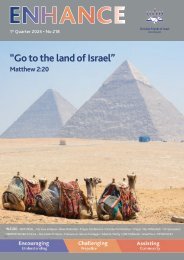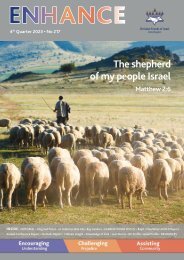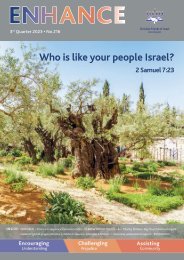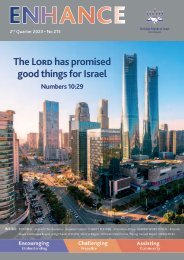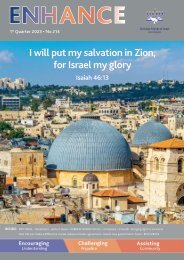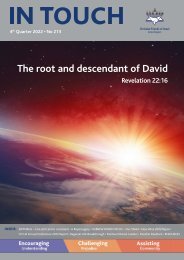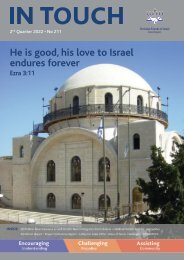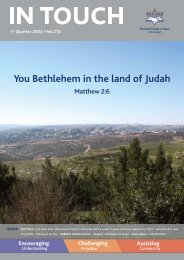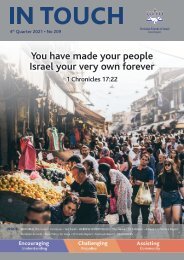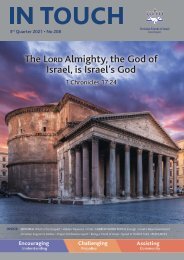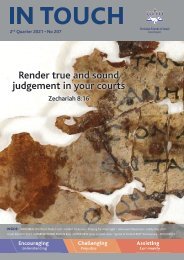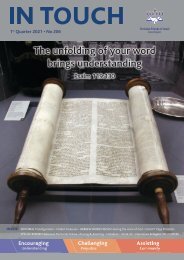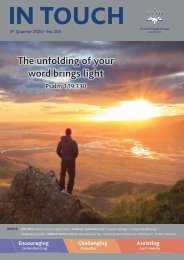Create successful ePaper yourself
Turn your PDF publications into a flip-book with our unique Google optimized e-Paper software.
NETANYAHU, ABBAS AND<br />
THE DAY OF ATONEMENT<br />
As Israel enters turblulent times, Chuck Missler considers the significance of Yom Kippur<br />
This year, Jews in Israel celebrate<br />
the High Holy days of Rosh<br />
Hashanah and Yom Kippur during<br />
a time of uncertainty. On September<br />
23 rd , Palestinian Authority President<br />
Mahmoud Abbas asked the United<br />
Nations to recognise a Palestinian State<br />
without having made even the most<br />
basic of concessions toward peace with<br />
Israel – like recognising Israel’s right to<br />
exist or denouncing terrorism. Yasser<br />
Arafat may be gone, and Mahmoud Abbas may want to<br />
settle things peaceably, but the true heart of the Palestinian<br />
Authority has not changed over the decades. At the bottom of<br />
their hearts, the Arab world considers Israel an infected sliver<br />
that wants a good pinch.<br />
“Palestinian President Mahmoud Abbas’s speech leaves<br />
little hope for the future,” said Knesset Speaker Reuven Rivlin<br />
(Likud) on Monday while meeting with Japanese Ambassador<br />
to Israel Haruhisa Takeuchi. Rivlin said, “(Abbas) cries over<br />
the loss of his home in Safed in ‘48, and not the establishment<br />
of the settlements in ‘67. Abbas’s speech illustrates in the best<br />
way why today, 63 years later, there isn’t peace between the<br />
sides.”<br />
Israeli Prime Minister Benjamin Netanyahu followed Abbas<br />
with his own speech, describing the dangers Israel faced to its<br />
security and calling for a return to negotiations. The United<br />
States has promised to veto the Palestinian statehood bid,<br />
but the whole charade demonstrates how futile attempts at<br />
negotiating have become. Everybody senses it. There are<br />
certain items on which neither Israel nor the Arabs are willing<br />
to budge.<br />
East Jerusalem appears to be one of those items. Since 1967,<br />
the Jews have had control over all of Jerusalem, including the<br />
Old City with the Western Wall and Temple Mount. Although<br />
the Islamic Waqf controls the actual Temple Mount, the site<br />
remains Judaism’s holiest as the location of the ancient Temple<br />
that once housed the Ark of the Covenant. No Hebrew prayer<br />
is permitted on the Temple Mount, but many Jews don’t mind;<br />
they do not want to accidentally tread across the spot that<br />
once held the Temple’s Holy of Holies. The Palestinians may<br />
want East Jerusalem back as part of a peace agreement, but<br />
nobody should ask the Jews to give up the part of Jerusalem<br />
that holds the Western Wall or the ancient site of the Temple.<br />
For Netanyahu, it’s not a remote option.<br />
Yom Kippur is the most holy day of the Jewish year. The<br />
Day of Atonement is observed on the 10 th of Tishri, which<br />
this year starts at sunset on Friday, October 7 th and ends at<br />
sunset on October 8 th . All day on the 10 th of Tishri, Jews will<br />
take off work and fast for this holy and most solemn day of<br />
repentance and reconciliation.<br />
When the Temple still stood, it was on this day - the only<br />
day - that the High Priest was able to enter the Holy of<br />
Holies, and then only after elaborate ceremonial washings,<br />
offerings, and associated rituals. This was also the day that<br />
two goats were selected. One goat was killed as an offering to<br />
atone for sins, and one, the “scapegoat,” had the nation’s sins<br />
ceremonially placed on it and was sent into the wilderness<br />
in order to remove those sins far away from the people. The<br />
ceremonial acts that were to be carried out by the High Priest<br />
on Yom Kippur are described in Leviticus 16 (see also Exodus<br />
30:10; Leviticus 23:27-31, 25:9; Numbers 29:7-11).<br />
Yom Kippur traditionally ends with one long note of<br />
the Shofar, a musical instrument made from a ram’s horn.<br />
The significance of the ram’s horn is traditionally rooted in<br />
Genesis 22. Here God commands Abraham “Take now thy<br />
son, thine only son Isaac, whom thou lovest, and get thee into<br />
the land of Moriah; and offer him there for a burnt offering<br />
upon one of the mountains which I will tell thee of,” (Genesis<br />
22:2). Abraham is called upon by God to sacrifice his only<br />
son, Isaac, as a test of his faith. After God halts the sacrifice at<br />
the last minute, Abraham spies a ram trapped by his horns in<br />
a nearby thicket and offers the animal instead of his son.<br />
It is interesting to note that this is the first instance in<br />
which the word “love” appears in Scripture. God commands<br />
Abraham to sacrifice “thine only son Isaac, whom thou<br />
lovest.” <strong>In</strong> this passage Isaac is identified as Abraham’s<br />
only son, without mention of Ishmael. Isaac was the son of<br />
promise, and Abraham was acting out prophecy.<br />
When Isaac asked his father where was the lamb to sacrifice<br />
for the burnt offering, Abraham said, “My son, God will<br />
provide himself a lamb…” That day, God provided a ram to<br />
take the place of Isaac, but He ultimately had another Lamb<br />
to take the place of Isaac and Abraham and the rest of us as<br />
well. It is suspected that the particular mountain Abraham<br />
took Isaac in the land of Moriah is the same mount on the<br />
eastern edge of what is now Jerusalem where Solomon built<br />
the Temple (2 Chronicles 3:1), and the uppermost part of that<br />
mountain is believed to be the very spot where the “only<br />
Son” of God was later crucified.<br />
Woven throughout the Old Testament feasts is the<br />
foreshadowing of God’s plan for the redemption of mankind.<br />
Those of us who have placed our trust in Jesus Christ are<br />
able to enter behind the veil and stand in the Holy of Holies.<br />
We have forgiveness because of the sacrificial death of Jesus<br />
Christ on the cross. He is our scapegoat. Our sins are placed<br />
on him and sent far far away. His blood was sprinkled for our<br />
atonement, and because of him we are cleansed and made<br />
holy before God.<br />
May Israel continue to trust in the LORD as did Abraham,<br />
and may the Messiah soon come and reign in torn and weary<br />
Jerusalem. The heathen may rage and plot, but God is in<br />
charge. He says, “Yet have I set my king upon my holy hill of<br />
Zion. I will declare the decree: the LORD hath said unto me,<br />
Thou art my Son; this day have I begotten thee.” (Psalm 2:6-7)<br />
Taken from khouse.org used with permission<br />
6 // IN TOUCH


